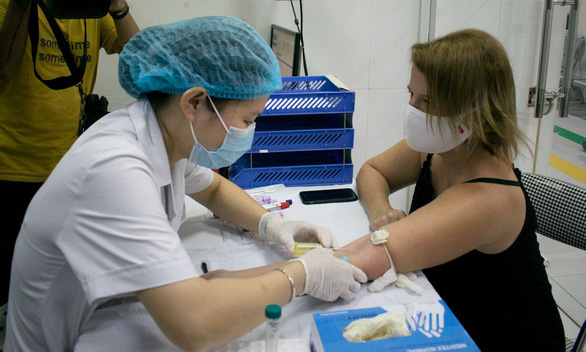.jfif) Opinion
Opinion


|
| Kelly Michelle Koch, American, 50 years old, who has recovered from COVID-19, donates her plasma on Wednesday. — Photo tuoitre.vn |
Dr Vũ Thị Thu Hương, head of the Department of Health Examination of the National Hospital for Tropical Diseases, talks to Sức Khỏe&Đời Sống (Health&Life) newspaper under the health ministry on convalescent plasma therapy for COVID-19 patients.
The National Hospital for Tropical Diseases has recently called on recovered COVID-19 patients to donate their plasma, which would be used to treat critically ill patients. How many people have donated so far?
One week since the call for donation, 17 recovered COVID-19 patients have registered to donate their plasma, including two who have had their plasma sample taken. Others are waiting for screening results.
On the morning of August 12, five patients visited the hospital to have tests to check whether they are qualified to donate.
A recovered American patient named Kelly, living in HCM City and treated at Củ Chi Field Hospital, took a flight to Hà Nội to register.
Patient No 196, a medical worker who wants to donate plasma since he recovered, also registered right after we made a call.
Who is qualified for plasma donation?
Plasma donors must be between 18 and 65 years old and weigh more than 50kg for men and 45kg for women who have recovered from COVID-19 and were discharged from hospital for at least 14 days.
They will be tested for diseases such as hepatitis B, HIV and syphilis. After donating plasma, they will be monitored for 24 hours and can go back home after that.
The donation is not recommended for pregnant women, those who have given birth more than three times and those suffering from a blood clotting disorder.
Does plasma donation have any negative impacts?
It does not affect health but has only on-the-spot reactions such as bruises or infections.
Those who want to donate plasma must declare their health status and have their body temperatures taken at the hospital to make sure they are not in close contact with COVID-19 patients.
How does plasma work when COVID-19 patients are treated with it?
Currently, the COVID-19 pandemic is evolving with rapid transmission across the world. Treatment for patients with COVID-19 is primarily based on their symptoms. Some antiviral drugs are included in treatment therapies but do not properly work.
Many countries are racing to research a vaccine.
Plasma is considered a safe and effective treatment solution for patients with COVID-19, especially those in critical conditions.
The plasma of recovered patients contains antibodies that help fight off SARS-CoV-2
When it is injected into the body of critically-ill patients (with a high viral load), the antibodies will take effect.
The extracted plasma samples are stored at minus 18-25 degrees Celsius, will be used within 12 months and can be transported far distances in the minus temperature condition.
Has this treatment method been used before and how does it work?
Plasma therapy has been used for a long time in the epidemics in the early 20th century such as influenza, mumps and measles.
According to eight studies during the H1N1 influenza pandemic in 1918 on 1,703 patients, the use of plasma taken from recovered patients significantly reduced the mortality rate.
The plasma therapy was also used in the SARS pandemic in 2003 and to push back Ebola.
This therapy has been studied and applied in many countries around the world to fight against COVID-19.
In China, doctors have used the plasma of recovered patients to treat critically-ill patients, showing positive results. The therapy has also been included in the treatment guidelines for COVID-19 at hospitals.
We want patients who have recovered from COVID-19 to donate their plasma to help treat other patients, especially those in critical conditions.
The amount of plasma needed to be taken is about 600ml per person. With advanced equipment, we can separate plasma from blood cells. Leucocytes, erythrocyte and platelets remain in the donor’s body.
There are almost no health effects on donors. After donating plasma, it is possible to compensate for the lack of fluid so the donor can stabilise their health immediately.
Patients who have recovered from COVID-19 can contact the hotline 19003228 or the Department of Social Affairs, National Hospital for Tropical Diseases for consultation. — VNS




